

New Pathways: A Step Towards Fine-Tuning Treatments for ME/CFS? Most chronic fatigue syndrome (ME/CFS) studies focus on females, but for once we have a study contrasting females and males.
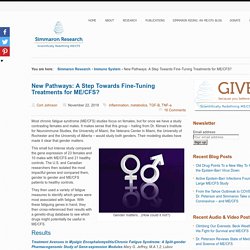
It makes sense that this group – hailing from Dr. Klimas’s Institute for Neuroimmune Studies, the University of Miami, the Veterans Center in Miami, the University of Rochester and the University of Alberta – would study both genders. Their modeling studies have made it clear that gender matters. Gender matters…(How could it not?) Solid Ground at Last? Cytokines Make Good in Major ME/CFS Review. The immune system in chronic fatigue syndrome (ME/CFS) has been kind of like a mirage in the desert.
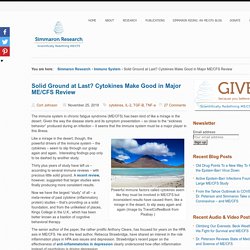
Given the way the disease starts and its symptom presentation – so close to the “sickness behavior” produced during an infection – it seems that the immune system must be a major player in this illness. Powerful immune factors called cytokines seem like they must be involved in ME/CFS but inconsistent results have caused them, like a mirage in the desert, to slip away again and again (Image by TravelCoffeeBook from Pixabay ) Like a mirage in the desert, though, the powerful drivers of the immune system – the cytokines – seem to slip through our grasp again and again. Interesting findings pop only to be dashed by another study. Thirty plus years of study have left us – according to several immune reviews – with precious little solid ground. The senior author of the paper, the rather prolific Anthony Cleare, has focused for years on the HPA axis in ME/CFS. The Review Synchronicity Dr. Major Research Group Highlights Inflammation Energy Production Connection in ME/CFS.
We propose that chronic low-grade inflammation induces and/or maintains persistent fatigue by inducing an imbalance between cellular-energy availability and cellular- and behavioral energy expenditure.
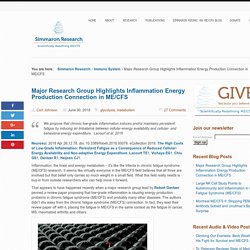
Lacourt et al. 2018 Neurosci. 2018 Apr 26;12:78. doi: 10.3389/fnbeh.2018.00078. eCollection 2018. Cytokine Inflammation and Management in Fibromyalgia and Chronic Fatigue Syndrome - Prohealth. Dysautonomia - Modern research. We know that we must constantly consume oxygen in order to carry out normal cellular metabolism.
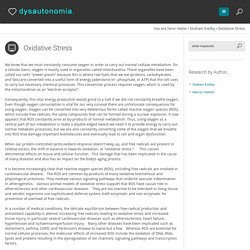
On a cellular basis, oxygen is mostly used in organelles called mitochondria. These organelles have been called our cells’ “power-plants” because this is where raw fuels that we eat (proteins, carbohydrates, and fats) are converted into a useful form of energy (adenosine tri- phosphate, or ATP) that the cell uses to carry out necessary chemical processes. This conversion process requires oxygen, which is used by the mitochondrion as an “electron acceptor”.
Consequently, this vital energy production would grind to a halt if we did not constantly breathe oxygen. Even though oxygen consumption is vital for our very survival there are unfortunate consequences for using oxygen. Chronic fatigue syndrome: inflammation, immune function, and neuroendocrine interactions. - PubMed - NCBI. Low-grade inflammation and arterial wave reflection in patients with chronic fatigue syndrome. - PubMed - NCBI. Why myalgic encephalomyelitis/chronic fatigue syndrome (ME/CFS) may kill you: disorders in the inflammatory and oxidative and nitrosative stress (IO&NS) pathways may explain cardiovascular disorders in ME/CFS. Central pathways causing fatigue in neuro-inflammatory and autoimmune illnesses. There is copious evidence establishing the causative role of peripheral immune activation and inflammation, evidenced by elevated levels of proinflammatory cytokines in the genesis of debilitating fatigue in neuro-inflammatory, autoimmune and inflammatory disorders [1,2].
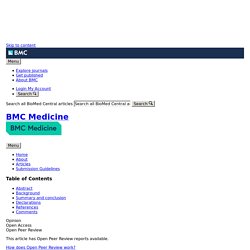
Activation of pathogen recognition receptors by pathogen associated molecular patterns leads to the production of nuclear factor NF-kappaB and subsequent production of proinflammatory cytokines by the myeloid differentiation primary response gene (88) (MYD88), which is a universal adapter protein that is used by almost all Toll-like receptors (TLRs) in dependent and independent pathways [3-5]. Systemic inflammatory stimuli, resulting from the presence of proinflammatory cytokines in the peripheral circulation, enter the brain via a number of routes [1,6] activating microglia and astrocytes inducing the production of proinflammatory cytokines and other neurotoxins leading to an environment of neuroinflammation [7,8]. The Neuroinflammatory Etiopathology of Myalgic Encephalomyelitis/Chronic Fatigue Syndrome (ME/CFS). - PubMed - NCBI.
Cytokine signature associated with disease severity in chronic fatigue syndrome patients. - PubMed - NCBI. Researchers identify biomarkers associated with chronic fatigue syndrome severity. Montoya, who oversees the Stanford ME/CFS Initiative, came across his first ME/CFS patient in 2004, an experience he said he’s never forgotten.
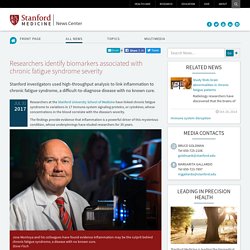
“I have seen the horrors of this disease, multiplied by hundreds of patients,” he said. “It’s been observed and talked about for 35 years now, sometimes with the onus of being described as a psychological condition. But chronic fatigue syndrome is by no means a figment of the imagination. This is real.” Antivirals, anti-inflammatories and immune-modulating drugs have led to symptomatic improvement in some cases, Montoya said. Still, the sporadic effectiveness of antiviral and anti-inflammatory drugs has spurred Montoya to undertake a systematic study to see if the inflammation that’s been a will-o’-the-wisp in those previous searches could be definitively pinned down.
To attack this problem, he called on Davis, who helped create the Human Immune Monitoring Center. Finding patterns. Brain Inflammation Now Documented in Chronic Fatigue Syndrome. Is chronic fatigue syndrome an inflammatory disease? Major Stanford Study Indicates Chronic Fatigue Syndrome (ME/CFS) is Inflammatory Disorder - Simmaron Research. There’s been a great deal of controversy and confusion surrounding ME/CFS — even whether it is an actual disease.
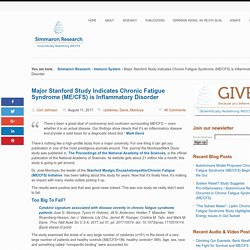
Our findings show clearly that it’s an inflammatory disease and provide a solid basis for a diagnostic blood test.” Mark Davis There’s nothing like a high-profile study from a major university. For one thing it can get you publication in one of the most prestigious journals around. The journal the Montoya/Mark Davis study was published in, The Proceedings of the National Academy of the Sciences, is the official publication of the National Academy of Sciences. Dr. The results were positive and that was good news indeed. Too Big To Fail?